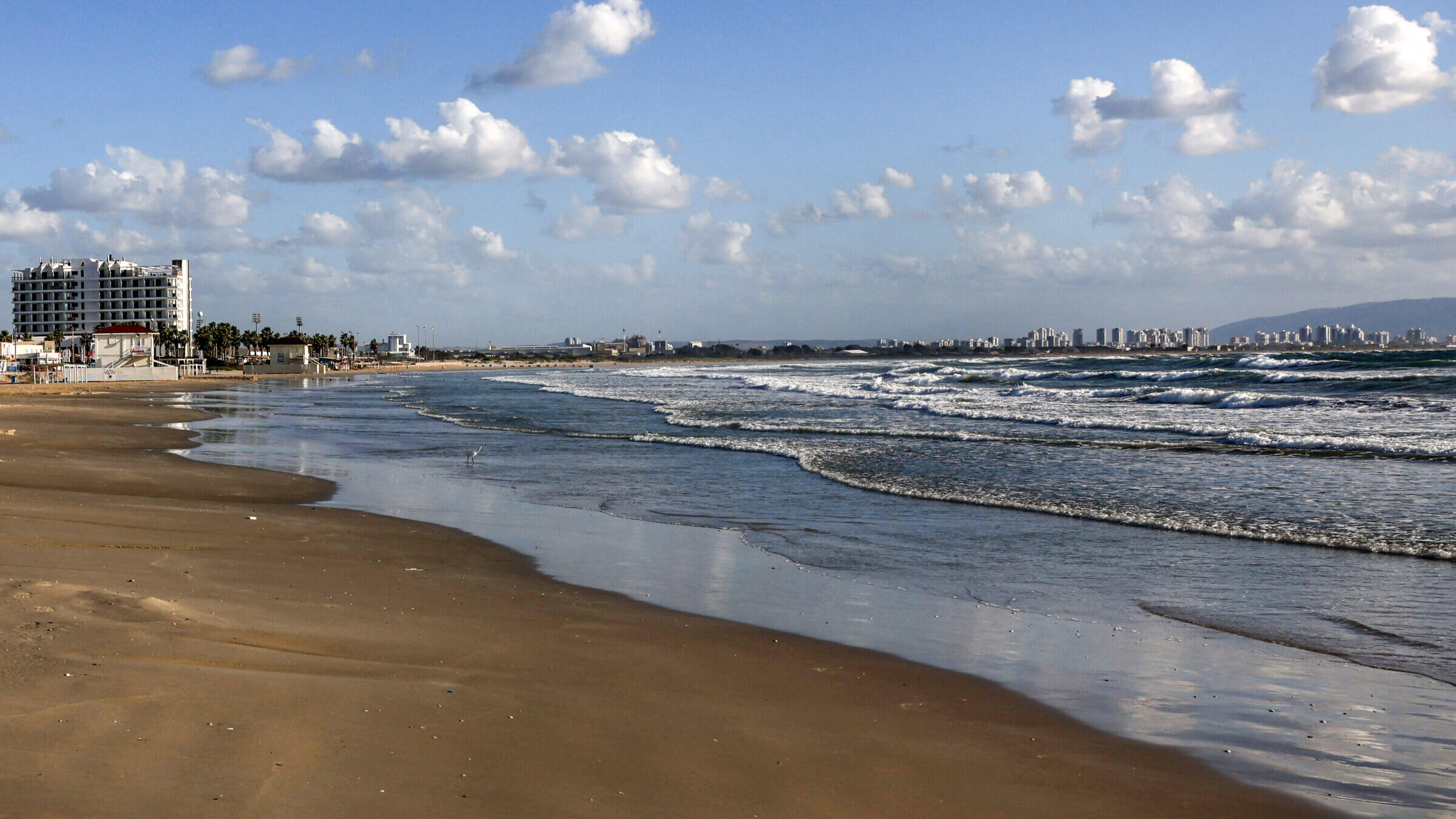BINTEL BRIEFShould an Israeli couple ‘seek safety’ in the US — even if it means caring for their host’s parrots?
Bintel says Jews have long survived turmoil by knowing when to leave. But the parrots could be a deal-breaker

An empty beach overlooking the Mediterranean sea in Acre, just across from the Haifa skyline on the right. Photo by Ahmad Gharabli/AFP via Getty Images
A Bintel Brief, Yiddish for a bundle of letters, has been solving reader dilemmas since 1906. Send yours via email, social media or this form.
Dear Bintel,
Should a couple living in Haifa who are dual citizens stay in Israel or seek safety in the U.S.? They have been offered free accommodations in a four-bedroom, multimillion-dollar home, car and artist studio. In return they would need to talk to and feed two parrots. Should they stay in Israel or come to the U.S. and be near their family?
Signed,
Stay or Go?
Dear Stay or Go,
Since Israel intensified its attacks on the Lebanese Shiite militia group Hezbollah, Haifa has become a near-ghost town in a veritable war zone. Beaches are empty, restaurants are closed, bomb shelters are packed, kids are attending school remotely and the main hospital is treating patients in a fortified underground parking garage.
Haifa and communities farther north in Israel have been under intermittent attacks since Oct. 7, when Hezbollah rushed to support its ally Hamas. Things have ramped up since Israel detonated thousands of boobytrapped pagers carried by Hezbollah members and assassinated its leader, Hassan Nasrallah. Many of Haifa’s 300,000 residents are in a constant state of anxiety amid frequent air-raid sirens that send them running to bomb shelters.
Who could blame anyone for wanting to leave, especially when the alternative sounds so inviting?
Now, I’m a New Yorker who’s lived in my crazy city through the urban decay of the 1960s and ’70s, the crack and AIDS epidemics of the 1980s, 9/11, Superstorm Sandy, the pandemic shutdown, riots, blackouts, strikes and intermittent crime waves (2,245 murders in 1990, compared to 391 last year).
So I’m the kind of person who can’t ever manage to get out of Dodge, though I know and love plenty of people who have. I’ve also never had rockets fired toward my apartment, never heard an air raid siren, and never spent hours stuck in a bomb shelter (though the building where I grew up had one stocked with canned food in case of nuclear war).
A pillar of salt
But I realize there are two kinds of people in the world: those who stay in a crisis and those who run. Both options take a certain kind of courage. Do you tough it out, or do you leave everything you know and love? Surely Jews would have disappeared altogether if at least some of our ancestors hadn’t fled the Inquisition, pogroms and the Third Reich.
It’s not clear from your letter in what capacity you approach this quandary. Are you part of the couple who would leave? Are you the host looking for a parrot-sitter? Are you an interested observer — friend or relative here or there, wanting to be near the couple in question — or just a buttinski? Whatever your vantage point, tell the Haifa duo that Bintel says — albeit with a shrug — more power to them if they can walk away. But they must make that choice without regret; remember, Lot’s wife looked back when fleeing Sodom and was turned into a pillar of salt.
And how lucky that, unlike early generations who had to scrounge for survival in Lower East Side tenements, a multimillion-dollar home awaits these refugees. Especially given the fact that Israelis from kibbutzim that were attacked on Oct. 7, as well as communities near Lebanon, are still living in temporary digs.
Christmas decorations and graffiti
I would assume that dual citizens know enough about American culture to know what to expect as religious minorities in a Christian-majority country. Even when surrounded by mishpacha or living in a Jewish neighborhood, it’s startling when Christmas decorations appear the day after Halloween and stores mistakenly stock matzo ahead of Rosh Hashanah.
Moving to the U.S. right now also means moving to a place that’s nearly as politically divided as Israel. Half of Americans despise Donald Trump; the other half love him, which is why we have no idea who the next president will be, or whether the election results will be accepted. There are more “Free Palestine” signs and graffiti here than hostage posters, and our news reports typically include school shootings, hurricanes, floods, blizzards and swastikas scrawled somewhere on something.
On the up side, we have fantastic bagels, and thanks to Southern cooking, we also have great brisket, even in places without Jewish delis. Not only are you likely to be safer here, you’ll find enough Jewish culture and community to sustain you — though it may be strange, at first, to see the streets thrum with activity on Friday night rather than slowing down for Shabbat.
I would say that these Haifa refugees will sleep better here without having to run to the nearest bomb shelter, but there’s one part of the plan that gives me pause. Parrots are incredibly noisy: They don’t just squawk; they literally scream.
I suppose it’s better than sirens.
Signed,
Bintel
Do you have a different take for Stay or Go? Email us at [email protected], or submit a question of your own via this anonymous form.





















